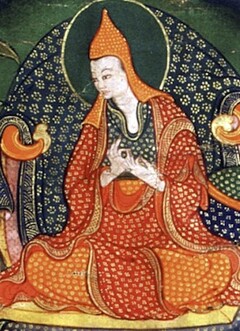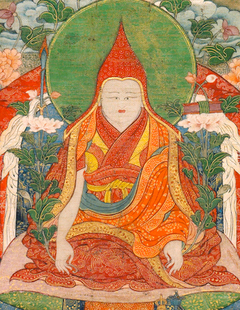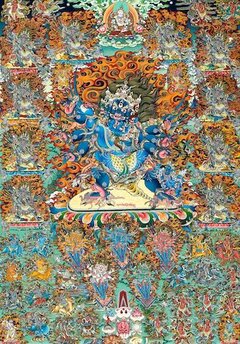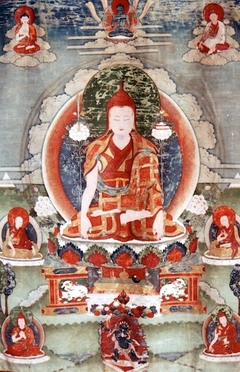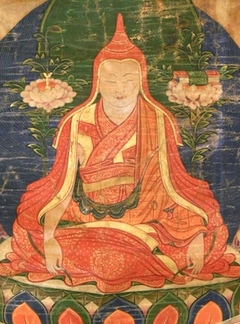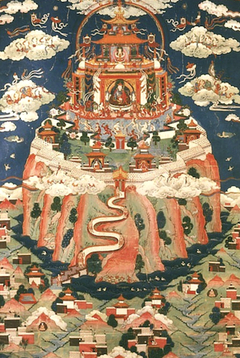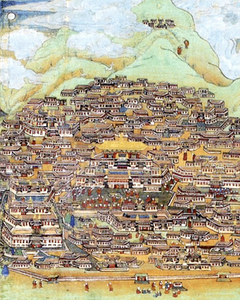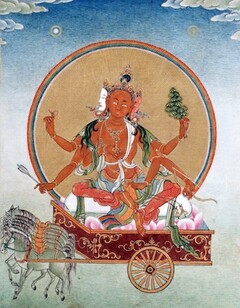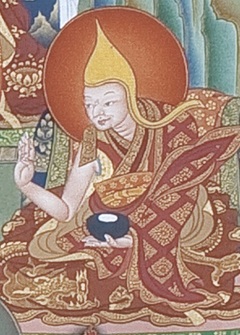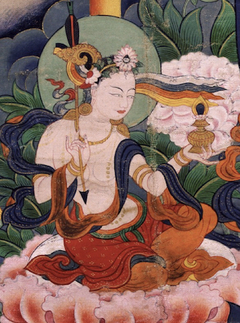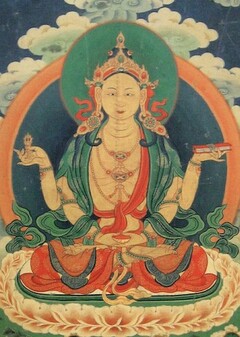
This catalogue, which includes an overview of the Nyingma and Dzogchen teachings that reappears in the writings of Jamgön Kongtrul and Dudjom Rinpoche, accompanied the 1833 edition of Vima Nyingtik commissioned by Prince Damtsik Dorje (1811–1852/53) of Derge.
This untitled prayer to the figures in the Vima Nyingtik lineage, from Samantabhadra to Khenchen Ngawang Palzang himself, was composed at the request of Tsangsé Chimé Dorje.
This text from volume two of Khenpo Ngaga's collected works is extracted verbatim from chapter three of "Presenting the Vajra Path of Secret Conduct" (gsang spyod rdo rje lam bstan), which is part of the Khandro Yangtik. As with many titles in Khenpo Ngaga’s collected works that he did not author, this passage was likely extracted to serve as the topic of teaching.
This lineage prayer for the Tantric System Vajrakīlaya invokes the masters of all the various lineages of Vajrakīlaya, including the King's tradition, the tradition of the Lady and Queen, and the Nanam tradition, as well as such accomplished masters as Darchar and Jigme Lingpa himself.
Part of the Cloud-Bank trilogy within the Lama Yangtik, this brief manual for taking non-conceptuality as the path is divided into four sections: (1) view, (2) meditation, (3) conduct, and (4) fruition.
Part of the Zabmo Yangtik preliminaries, here are four guru practices—outer, inner, secret, and ultimate—for cultivating devotion and inspiring realization.
Other recent additions
When Khenchen Jigme Puntsok was twenty-six, he had a dream in which he travelled to Guru Padmasambhava's pureland and participated in a gaṇacakra feast, during which this song was sung by a young girl. He then kept the song secret for thirty-one years before revealing it to others.
This simple daily practice of Vajrasattva, Narak Dongtruk (Dredger of the Depths of Hell), is an essentialization of the practice compiled by Lochen Dharmaśrī. As one of the most important yidam practices within the Nyingma Kama, it can be recited as a means of maintaining a connection with all the deity practices in the collection.
Latest Topic Introductions
A brief overview of the scholastic tradition in Tibetan Buddhism including references to its historical development.
A brief historical introduction to the goddess Mārīcī ('od zer can ma), goddess of the dawn, who is depicted in various forms, red and golden, and sometimes appears on the chariot that draws the sun:
Highlights from Archive
Extracted from The Sunlight of Eloquent Explanation: A Presentation of Exposition, Debate, and Composition ('chad rtsod rtsom gsum gyi rnam gzhag legs bshad nyin byed snang ba), this brief analysis discusses the qualities of an author, classifications of literary treatises and process of composing a treatise.
This devotional appeal to Guru Padmasambhava by one of his main consorts, Princess Mandāravā of Zahor, is adapted from The Golden Garland Chronicles (bka' thang gser phreng) revealed by Sangye Lingpa (1340–1396).
Featured Topic
Texts related to the Prajñāpāramitā (shes rab kyi pha rol tu phyin pa) or Transcendent Perfection of Wisdom/Insight, including the famous Heart Sūtra and Patrul Rinpoche's practical guide to meditating on such teachings.
13 texts
* Lotsāwa ལོ་ཙཱ་བ་; lo tsā ba n. Title used for native Tibetan translators who worked together with Indian scholars (or paṇḍitas) to translate major buddhist texts into Tibetan from Sanskrit and other Asian languages; it is said to derive from lokacakṣu, literally "eyes of the world". See also paṇḍita.
Lotsawa House is registered in the UK as a Community Interest Company (#14358325), a category of company which exists primarily to benefit a community or with a view to pursuing a social purpose, with all profits having to be used for this purpose.

